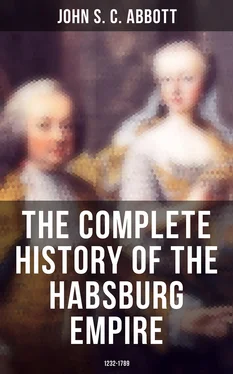The day was appointed for the king, in the presence of the whole army, to do homage to the emperor as his liege lord. It was the 25th of November, 1276. With a large escort of Bohemian nobles, Ottocar crossed the Danube, and was received by the emperor in the presence of many of the leading princes of the empire. The whole army was drawn up to witness the spectacle. With a dejected countenance, and with indications, which he could not conceal, of a crushed and broken spirit, Ottocar renounced these valuable provinces, and kneeling before the emperor, performed the humiliating ceremony of feudal homage. The pope in consequence withdrew his sentence of excommunication, and Ottocar returned to his mutilated kingdom, a humbler and a wiser man.
Rhodolph now took possession of the adjacent provinces which had been ceded to him, and, uniting them, placed them under the government of Louis of Bavaria, son of his firm ally Henry, the King of Bavaria. Bavaria bounded Austria on the west, and thus the father and the son would be in easy coöperation. He then established his three Sons, Albert, Hartmann, and Rhodolph, in different parts of these provinces, and, with his queen, fixed his residence at Vienna.
Such was the nucleus of the Austrian empire, and such the commencement of the powerful monarchy which for so many generations has exerted so important a control over the affairs of Europe. Ottocar, however, though he left Rhodolph with the strongest protestations of friendship, returned to Prague consumed by the most torturing fires of humiliation and chagrin. His wife, a haughty woman, who was incapable of listening to the voice of judgment when her passions were inflamed, could not conceive it possible that a petty count of Hapsburg could vanquish her renowned husband in the field. And when she heard that Ottocar had actually done fealty to Rhodolph, and had surrendered to him valuable provinces of the kingdom, no bridle could be put upon her woman's tongue. She almost stung her husband to madness with taunts and reproaches.
Thus influenced by the pride of his queen, Cunegunda, Ottocar violated his oath, refused to execute the treaty, imprisoned in a convent the daughter whom Rhodolph had given to his son, and sent a defiant and insulting letter to the emperor. Rhodolph returned a dignified answer and prepared for war. Ottocar, now better understanding the power of his foe, made the most formidable preparations for the strife, and soon took the field with an army which he supposed would certainly triumph over any force which Rhodolph could raise. He even succeeded in drawing Henry of Bavaria into an alliance; and many of the German princes, whom he could not win to his standard, he bribed to neutrality. Numerous chieftains, lured to his camp by confidence of victory, crowded around him with their followers, from Poland, Bulgaria, Pomerania, Magdeburg, and from the barbaric shores of the Baltic. Many of the fierce nobles of Hungary had also joined the standard of Ottocar.
Thus suddenly clouds gathered around Rhodolph, and many of his friends despaired of his cause. He appealed to the princes of the German empire, and but few responded to his call. His sons-in-law, the Electors of Palatine and of Saxony, ventured not to aid him in an emergence when defeat seemed almost certain, and where all who shared in the defeat would be utterly ruined. In June, 1275, Ottocar marched from Prague, met his allies at the appointed rendezvous, and threading the defiles of the Bohemian mountains, approached the frontiers of Austria. Rhodolph was seriously alarmed, for it was evident that the chances of war were against him. He could not conceal the restlessness and agitation of his spirit as he impatiently awaited the arrival of troops whom he summoned, but who disappointed his hopes.
"I have not one," he sadly exclaimed, "in whom I can confide, or on whose advice I can depend."
The citizens of Vienna perceiving that Rhodolph was abandoned by his German allies, and that they could present no effectual resistance to so powerful an army as was approaching, and terrified in view of a siege, and the capture of the city by storm, urged a capitulation, and even begged permission to choose a new sovereign, that they might not be involved in the ruin impending over Rhodolph. This address roused Rhodolph from his despondency, and inspired him with the energies of despair. He had succeeded in obtaining a few troops from his provinces in Switzerland. The Bishop of Basle, who had now become his confessor, came to his aid, at the head of a hundred horsemen, and a body of expert slingers. Rhodolph, though earnestly advised not to undertake a battle with such desperate odds, marched from Vienna to meet the foe.
Rapidly traversing the southern banks of the Danube to Hamburg, he crossed the river and advanced to Marcheck, on the banks of the Morava. He was joined by some troops from Styria and Carinthia, and by a strong force led by the King of Hungary. Emboldened by these accessions, though still far inferior in strength to Ottocar, he pressed on till the two armies faced each other on the plains of Murchfield. It was the 26th of August, 1278.
At this moment some traitors deserting the camp of Ottocar, repaired to the camp of Rhodolph and proposed to assassinate the Bohemian king. Rhodolph spurned the infamous offer, and embraced the opportunity of seeking terms of reconciliation by apprising Ottocar of his danger. But the king, confident in his own strength, and despising the weakness of Rhodolph, deemed the story a fabrication and refused to listen to any overtures. Without delay he drew up his army in the form of a crescent, so as almost to envelop the feeble band before him, and made a simultaneous attack upon the center and upon both flanks. A terrific battle ensued, in which one party fought, animated by undoubting confidence, and the other impelled by despair. The strife was long and bloody. The tide of victory repeatedly ebbed and flowed. Ottocar had offered a large reward to any of his followers who would bring to him Rhodolph, dead or alive.
A number of knights of great strength and bravery, confederated to achieve this feat. It was a point of honor to be effected at every hazard. Disregarding all the other perils of the battle, they watched their opportunity, and then in a united swoop, on their steel-clad chargers, fell upon the emperor. His feeble guard was instantly cut down. Rhodolph was a man of herculean power, and he fought like a lion at bay. One after another of his assailants he struck from his horse, when a Thuringian knight, of almost fabulous stature and strength, thrust his spear through the horse of the emperor, and both steed and rider fell to the ground. Rhodolph, encumbered by his heavy coat of mail, and entangled in the housings of his saddle, was unable to rise. He crouched upon the ground, holding his helmet over him, while saber strokes and pike thrusts rang upon cuirass and buckler like blows upon an anvil. A corps of reserve spurred to his aid, and the emperor was rescued, and the bold assailants who had penetrated the very center of his army were slain.
The tide of victory now set strongly in favor of Rhodolph, for "the race is not always to the swift, nor the battle to the strong." The troops of Bohemia were soon everywhere put to rout. The ground was covered with the dead. Ottocar, astounded at his discomfiture, and perhaps fearing the tongue of his wife more than the sabers of his foes, turned his back upon his flying army, and spurred his horse into the thickest of his pursuers. He was soon dismounted and slain. Fourteen thousand of his troops perished on that disastrous day. The body of Ottocar, mutilated with seventeen wounds, was carried to Vienna, and, after being exposed to the people, was buried with regal honors.
Rhodolph, vastly enriched by the plunder of the camp, and having no enemy to encounter, took possession of Moravia, and triumphantly marched into Bohemia. All was consternation there. The queen Cunegunda, who had brought these disasters upon the kingdom, had no influence. Her only son was but eight years of age. The turbulent nobles, jealous of each other, had no recognized leader. The queen, humiliated and despairing, implored the clemency of the conqueror, and offered to place her infant son and the kingdom of Bohemia under his protection. Rhodolph was generous in this hour of victory. As the result of arbitration, it was agreed that he should hold Moravia for five years, that its revenues might indemnify him for the expenses of the war. The young prince, Wenceslaus, was acknowledged king, and during his minority the regency was assigned to Otho, margrave or military commander of Brundenburg. Then ensued some politic matrimonial alliances. Wenceslaus, the boy king, was affianced to Judith, one of the daughters of Rhodolph. The princess Agnes, daughter of Cunegunda, was to become the bride of Rhodolph's second son. These matters being all satisfactorily settled, Rhodolph returned in triumph to Vienna.
Читать дальше












